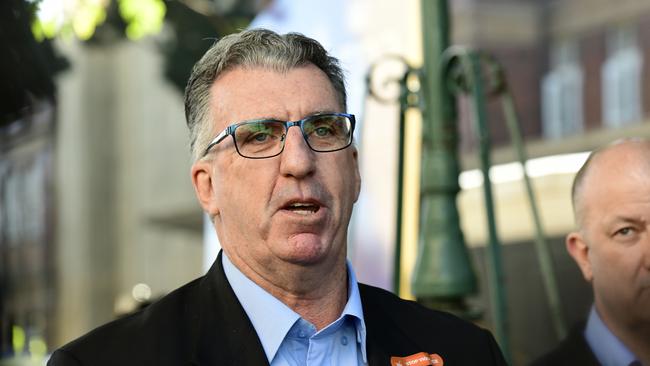Health Services Union pushes aged-care levy to boost funds
The Health Services Union wants a Medicare-style levy to fund a single-payer system for aged care.

The Health Services Union will launch a national campaign advocating for a Medicare-style levy to fund a single-payer system for aged care, piling pressure on Anthony Albanese to support a major funding package.
The multimedia campaign, dubbed Eldercare, will also involve an intensified lobbying effort by the union calling for an immediate funding boost across the nation.
Ahead of the Opposition Leader delivering a vision statement speech on Wednesday on “respecting older Australians”, HSU NSW-ACT-Queensland secretary Gerard Hayes said the government was “putting on sunscreen” while confronting an aged-care funding “tsunami”.
Mr Hayes said the HSU, which represents 98,000 members, would push hard for the ALP policy platform, which will be finalised at Labor’s national conference in December, to include strong commitments on aged care.
The union boss described support for aged care as “core business” for Labor but conceded funding commitments were “under question” towards the end of last year’s election campaign.
Citing what he claimed was a funding shortfall of between $5bn and 40bn, Mr Hayes said the HSU was pushing for a universal, single-payer system for aged care, funded by a Medicare-style levy.
Mr Hayes said the HSU, which represents 25,000 aged-care workers, had commissioned economic research to examine the levy but he was confident all taxpayers, even those not accessing aged care, would support the best care options for older Australians.
Under Scott Morrison, the Coalition has positioned aged care as a key priority and launched a royal commission, due to report by November 12.
Mr Hayes said the current government funding model was “piecemeal and time-poor”, and he suggested workers in industries that have closed down factories and power stations should be supported in moving into the aged-care sector.
“Aged care is a growing industry and one of the keys is to attract and retain people especially in regional areas,” Mr Hayes said.
The HSU has expressed concern that aged-care providers had begun cutting back on carers, cleaners and catering and that outsourcing had led to wage theft. A survey by the union showed four-in-10 of its members were planning on quitting the sector over the next five years.
The Eldercare campaign will focus on the need for a permanent and sustainable revenue stream for aged care.
Mr Hayes, who said properly funded aged care could provide an “economic anchor for regional communities”, confirmed the union was organising meetings with Nationals MPs including Barnaby Joyce to highlight sector deficiencies in rural areas.
“We’re going to be agitating at all levels, left and right, to ensure aged-care funding is an issue that can be proactively dealt with,” he said.
Opposition ageing and seniors spokeswoman Julie Collins described Australia’s aged-care system as being “in crisis” but did not immediately back the HSU levy proposal. She said Labor would announce its policies “closer to the election”.
“Under the Liberals, aged-care waiting lists have blown out and standards of care have deteriorated. There isn’t a week that goes by without another shocking story about aged care in this country,” Ms Collins said.
“Older Australians can be assured Labor is listening to everyone who cares about fixing our country’s broken aged-care system.”
Mr Albanese said the government viewed the aged-care “crisis” as a distraction.
“They’re just obsessed with themselves and their internal fights. What they should be concerned about are the causes that Australians care about, including aged-care crises, including addressing the flatlining economy, including dealing with the challenge of climate change,” Mr Albanese said.
A spokesman for Aged Care and Senior Australians Minister Richard Colbeck said the government had delivered “record investment” across the aged-care system, including an increase of more than “$5bn of extra support” over the forward estimates.



